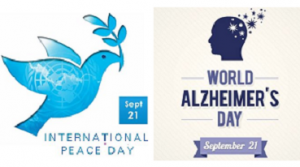International Day of Peace and World Alzheimer’s Day is celebrated every year on September 21, 2016 across the world.
September 21 – World Peace Day
The International Day of Peace, sometimes unofficially known as World Peace Day, is observed annually on 21 September. It is dedicated to world peace, and specifically the absence of war and violence, such as might be occasioned by a temporary ceasefire in a combat zone for humanitarian aid
2016 Theme : “The Sustainable Development Goals: Building Blocks for Peace”.
- The day was first celebrated in 1982, and is kept by many nations, political groups, military groups, and peoples. In 2013, for the first time, the Day was dedicated by the Secretary-General of the United Nations to peace education, the key preventive means to reduce war sustainably.
- To inaugurate the day, the United Nations Peace Bell is rung at UN Headquarters in New York City.
- The bell is cast from coins donated by children from all continents except Africa, and was a gift from the United Nations Association of Japan, as “a reminder of the human cost of war”; the inscription on its side reads, “Long live absolute world peace”.
- The 17 Sustainable Development Goals were unanimously adopted by the 193 Member States of the United Nations at an historic summit of the world’s leaders in New York in September 2015. The new ambitious 2030 agenda calls on countries to begin efforts to achieve these goals over the next 15 years. It aims to end poverty, protect the planet, and ensure prosperity for all.
- The Sustainable Development Goals are integral to achieving peace in our time, as development and peace are interdependent and mutually reinforcing.
- Sustainability addresses the fundamental needs of the present without compromising the ability of future generations to meet their own needs.
- Modern challenges of poverty, hunger, diminishing natural resources, water scarcity, social inequality, environmental degradation, diseases, corruption, racism and xenophobia, among others, pose challenges for peace and create fertile grounds for conflict.
- Sustainable development contributes decisively to dissipation and elimination of these causes of conflict and provides the foundation for a lasting peace. Peace, meanwhile, reinforces the conditions for sustainable development and liberates the resources needed for societies to develop and prosper.
- Every single one of the 17 Sustainable Development Goals is a building block in the global architecture of peace. It is critical that we mobilize means of implementation, including financial resources, technology development and transfer, and capacity-building, as well as the role of partnerships. Everyone has a stake and everyone has a contribution to make.
 September 21 – World Alzheimer’s Day
September 21 – World Alzheimer’s Day
World Alzheimer’s Day, September 21st of each year, is a day on which Alzheimer’s organizations around the world concentrate their efforts on raising awareness about Alzheimer’s and dementia.
2016 Theme: “Remember Me”
- Alzheimer’s disease is the most common form of dementia, a group of disorders that impairs mental functioning. Alzheimer’s disease is often called a family disease, because the chronic stress of watching a loved one slowly decline affects everyone. 5.4 million Americans are living with Alzheimer’s.
- Alzheimer’s disease is the sixth-leading cause of death in the United States and the only cause of death among the top 10 in the United States that cannot be prevented, cured or even slowed. With the increases in life spans and baby boomers coming of age, support for Alzheimer’s research is more critical to our families than ever.
About Alzheimer’s disease:
- Alzheimer’s disease(AD), also known as just Alzheimer’s, is a chronic neurode generative disease that usually starts slowly and gets worse over time. It is the cause of 60% to 70% of cases of dementia.[1][2] The most common early symptom is difficulty in remembering recent events (short-term memory loss).
- As the disease advances, symptoms can include problems with language, disorientation (including easily getting lost), mood swings, loss of motivation, not managing self care, and behavioural issues. As a person’s condition declines, they often withdraw from family and society.
- Gradually, bodily functions are lost, ultimately leading to death.Although the speed of progression can vary, the average life expectancy following diagnosis is three to nine years.
- The cause of Alzheimer’s disease is poorly understood.About 70% of the risk is believed to be genetic with many genes usually involved. Other risk factors include a history of head injuries, depression, or hypertension.
- The disease process is associated with plaques and tangles in the brain. A probable diagnosis is based on the history of the illness and cognitive testing with medical imaging and blood tests to rule out other possible causes. Initial symptoms are often mistaken for normal ageing. Examination of brain tissue is needed for a definite diagnosis.
- Mental and physical exercise, and avoiding obesity may decrease the risk of AD. There are no medications or supplements that decrease risk.
- No treatments stop or reverse its progression, though some may temporarily improve symptoms.Affected people increasingly rely on others for assistance, often placing a burden on the caregiver; the pressures can include social, psychological, physical, and economic elements. Exercise programmes are beneficial with respect to activities of daily living and can potentially improve outcomes.
- Treatment of behavioural problems orpsychosis due to dementia with antipsychotics is common but not usually recommended due to there often being little benefit and an increased risk of early death.
- In 2015, there were approximately 48 million people worldwide with AD. It most often begins in people over 65 years of age, although 4% to 5% of cases are early-onset Alzheimer’s which begin before this.
- It affects about 6% of people 65 years and older. In 2010, dementia resulted in about 486,000 deaths.It was first described by, and later named after, German psychiatrist and pathologist Alois Alzheimer in 1906. In developed countries, AD is one of the most financially costly diseases.

